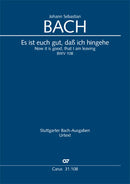| 作曲者 | Johann Sebastian Bach (1685-1750)・ヨハン・セバスティアン・バッハ |
| タイトル | Es ist euch gut, daß ich hingehe, BWV 108 (Score) |
| サブタイトル | Cantata for the Sunday Cantata |
| 出版社 | Carus・カールス |
| 楽器編成 | 混声合唱 |
| 楽器編成(詳細) | Soli ATB,Coro SATB,2 Obda,Violin solo,2 Violins,Viola,Basso continuo |
| 品番 | M007047900 |
| 校訂者 | Reinhold Kubik |
| 編曲者 | Paul Horn |
| 難易度 | 中級 |
| 言語 | ドイツ語・英語 |
| 形状 | 68 ページ・21 x 29.7 cm・246 g・ソフトカバー |
| 演奏時間 | 20分 |
| 作曲年 | 1725年 |
| 出版年 | 1983年 |
| 出版番号 | CV 31.108/00 |
| ISMN | 979-0-007-04790-0 |
| サンプル | https://www.carusmedia.com/images-intern/medien/30/3110800/3110800x.pdf |
The cantata “Es ist euch gut, dass ich hingehe” [It is well that I go forth] BWV 108 for Cantate Sunday is one of the cantatas composed on texts by the Leipzig poetess Christiane Mariane von Ziegler with which Bach concluded his second annual cycle of cantatas after he had abandoned the annual cycle of chorale cantatas at Easter 1725. The text contains two sayings by Jesus which are taken directly from the Sunday gospel reading (John 16:5-15). The quotation opening the cantata was set by Bach as a bass aria with solo oboe d’amore, it breathes tranquility and assurance. The second quotation, however, is set as an extended choral fugue in three sections, it forms the center of the cantata. The free text surrounding the biblical quotations is divided into two arias in which the emphasis is on melodic lines, there is only one single recitative, the original text of which was substantially abridged by Bach. A four-part chorale concludes the cantata.



